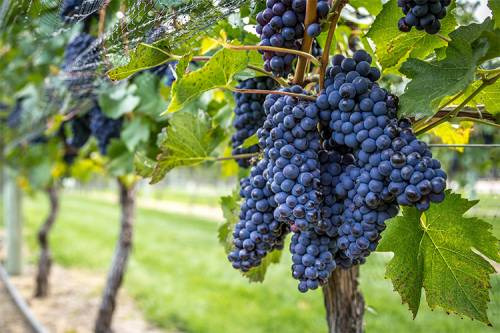Brussels – Global warming puts vineyards of the Mediterranean basin at risk from the spread of the plant infection known as Pierce’s disease. According to data from the Copernicus Land Monitoring Service (CLMS), Pierce’s disease, which originated in the Americas, where it devastated local vineyards, has now reached various regions of the Mediterranean and is caused by a subspecies of Xylella fastidiosa — a bacterium that kills the host plant by choking off its water and nutrient reserves — and that also affected another subspecies, century-old olive trees in Puglia. “Now, European vineyards could be next to be affected, potentially impacting a market worth 130 billion euros in 2022,” the Service warned.
“What makes the threat of a Xylella epidemic in the Mediterranean all the more possible is the anticipated rise in temperatures driven by climate change, given that the bacterium thrives in warmer conditions. This puts islands among the most vulnerable territories. In fact, their gentle microclimates mean that infected plants cannot recover through “winter curing” — namely, the death of the bacteria in the winter period following the seasonal temperature drop,” CLMS said.
According to the data, one island that stands out as facing a significant threat is Mallorca. Not only is it the sole region in Europe already grappling with Pierce’s disease in vineyards, but to compound matters, all three main subspecies of Xylella fastidiosa have been found there, posing a threat to olive and almond trees too. Against this background, Àlex Giménez-Romero and Manuel Matías — researchers at the Mallorca Institute for Cross-Disciplinary Physics and Complex Systems – began studying, to predict the risk of Pierce’s disease outbreaks across Europe under different global warming scenarios. Using various climate projections, they modeled the proliferation of both the Xylella bacteria and the sap-feeding insect Philaenus spumarius, which carries the bacteria from plant to plant as understanding the interplay between the bacterium and its carrier is key to anticipating potential outbreaks. “While warmer temperatures fuel bacterial growth, they are also expected to create drier conditions in Europe, which hamper the insect population and thereby stunt the disease’s spread,” explains Àlex.
The two researchers worked with a multidisciplinary team of physicists, mathematicians, biologists, entomologists, and climate scientists, and together they assessed the growing risk on various geographic scales, from the national level to that of regions with Protected Designation of Origin (PDO) status at the very heart of wine territories. Specifically, for this last phase, the team used data from Corine Land Cover (CLC), the pan-European land cover inventory of the Copernicus Land Monitoring Service (CLMS). “CLC not only allowed us to pinpoint vineyard locations but, thanks to the spatial resolution of its data, also to obtain the shape of each vineyard. From it, we could estimate the total area of vineyards at risk in each country,” Manuel pointed out.
The results paint a worrying picture. For example, the team found that under the current global warming scenario of +1.5°C, the share of vineyard area at risk is about 25 percent for French PDO regions and 60 percent for Italian PDO regions. Important European PDOs, such as parts of the southern Rhone Valley, Provence, and Languedoc in France, Penedés in Spain, Bairrada in Portugal, and Chianti and Brunello di Montalcino in Italy, could be threatened by the bacteria. The two researchers also found that if average global temperatures increase by +3°C, the risk of Pierce’s disease spreading beyond the Mediterranean region into previously unaffected continental areas of France and Italy-such as Aquitaine and Lombardy-would increase significantly.
Therefore, the situation is launching warnings that call for urgently developing countermeasures to mitigate the spread of the disease. “By identifying the regions with the highest risk, policymakers can strategically intervene in these areas,” explains Manuel. Yet, which measures are the most effective is still an open question. One approach to limit the spread of the disease is to cut down large numbers of trees, a drastic measure that authorities in Puglia resorted to. Efforts to cultivate disease-resistant plant varieties are also underway, although this strategy seems to lead to less flavorful produce. “At the moment, the main way of acting against this disease is controlling the insect population,” says Manuel. “This typically involves clearing away herbaceous plants and shrubs that play a role in the insect’s lifecycle.”
English version by the Translation Service of Withub

![[foto: Rasheedhrasheed/Wikimedia Commons]](https://www.eunews.it/wp-content/uploads/2025/04/A_glass_of_wine-350x250.jpg)
![[foto: Igor Gorshkov, WIkimedia Commons]](https://www.eunews.it/wp-content/uploads/2025/04/Dinner_Degustation_203239353-350x250.jpeg)






![Il presidente del Consiglio europeo, Antonio Costa (sinistra) con il primo ministro sloveno, Robert Golob [Bruxelles, 26 giugno 2025. foto: European Council]](https://www.eunews.it/wp-content/uploads/2025/06/costa-golob-120x86.jpg)